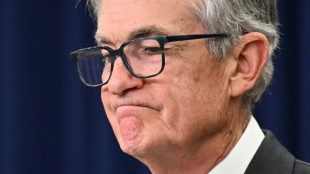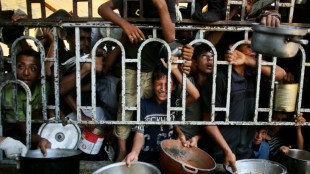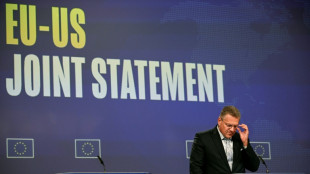
| RYCEF | 1.36% | 13.94 | $ | |
| CMSD | 0.33% | 23.768 | $ | |
| GSK | 0.42% | 40.24 | $ | |
| RIO | 0.71% | 61.055 | $ | |
| NGG | -1.01% | 71.36 | $ | |
| RBGPF | 0% | 73.27 | $ | |
| SCS | -0.19% | 16.15 | $ | |
| BP | 0.04% | 33.895 | $ | |
| VOD | -0.72% | 11.815 | $ | |
| BTI | 0.16% | 59.105 | $ | |
| CMSC | 0.04% | 23.45 | $ | |
| JRI | -0.15% | 13.31 | $ | |
| BCC | -0.49% | 84.09 | $ | |
| BCE | -0.7% | 25.56 | $ | |
| RELX | -1.26% | 48.085 | $ | |
| AZN | 0.14% | 80.63 | $ |
Pro-EU mayor, nationalist historian set for Polish presidential runoff

Pro-EU Warsaw mayor Rafal Trzaskowski was set to face nationalist historian Karol Nawrocki in Poland's presidential runoff on June 1, an exit poll showed after the first round, as the far-right made record advances.
An overall victory for Trzaskowski would be a boost for the centrist government led by former European Union leader Donald Tusk, which has been at loggerheads with the current nationalist president.
A Nawrocki win would likely extend the political deadlock and analysts predict that fresh parliamentary elections may have to be called.
Trzaskowski was expected to get 30.8 percent of the vote and historian Nawrocki 29.1 percent in Sunday's first round, according to an Ipsos poll.
Preliminary results are expected early Monday.
"This result shows... how determined we have to be, how much work lies ahead of us," Trzaskowski told supporters in the south-eastern town of Sandomierz.
Nawrocki struck a defiant tone: "We must win these elections to prevent one political camp's monolopy of power."
The two candidates have diverging views on abortion and LGBTQ rights. The election also comes at a fraught moment for Europe as Russia's invasion of Ukraine drags on, ties with Washington are under strain and far-right populists make electoral gains.
The far-right in Poland was no exception, with its two candidates -- Eurosceptic multi-millionaire entrepreneur Slawomir Mentzen and ultra-nationalist MEP Grzegorz Braun -- tipped to receive 21.6 percent between the two of them.
"This is the greatest success in the history of our political camp," Mentzen said.
Wojciech Przybylski, head of the Res Publica foundation, said the far-right's strong showing "means that Trzaskowski can't be absolutely sure of winning".
"The runoff result will depend on turnout and mobilisation among youths who voted for Mentzen" and leftist candidate Adrian Zandberg, he told AFP.
Wojciech Kuras, 44, said he did not vote for Trzaskowski but might in the runoff.
"It will be hard for Rafal Trzaskowski. This is such a difficult result because if others join together it can be equal," said the entrepreneur from Sandomierz.
- 'All-or-nothing' -
Prime Minister Tusk said an "all-or-nothing" battle had begun.
"It will be a tough fight for every vote. These two weeks will decide the future of our homeland," he said on X.
Political scientist Ewa Marciniak said the electoral campaign would be "brutal".
"Each candidate will try to discredit his rival at all costs, by any means necessary," she told AFP.
So far, the electoral campaign in the EU and NATO member largely revolved around foreign policy, showcasing a clash of philosophies over Poland's engagement with the EU and the United States.
But social issues have also played a part.
Trzaskowski, 53, has promised to support abortion and LGBTQ rights.
"These elections are about rights for women and minorities... They are about security in the European Union," said Anna Rusztynska-Wolska, a 69-year-old doctor, after voting.
The former ruling Law and Justice party (PiS), which backs Nawrocki, was frequently at odds with Poland's Western allies and EU institutions in Brussels over rule-of-law concerns.
Nawrocki, 42, is an admirer of US President Donald Trump. He said Trump told him "You will win" when they met at the White House earlier this month.
The key to the election could be whether supporters of Mentzen, the far-right candidate who came third in the exit poll with 15.4 percent, back Nawrocki in the second round.
Mentzen is a eurosceptic libertarian staunchly opposed to abortion and migrants.
He has accused the country's one million Ukrainians of taking advantage of Poland.
- High stakes for Europe -
The governing coalition is hopeful a Trzaskowski victory would enable it to carry out undelivered campaign pledges.
Tusk's administration has been prevented from easing Poland's stringent abortion laws by the president's power of veto.
The stakes are high for Europe.
Under Tusk, Poland has grown more important on the continent, reinforcing its position as a key voice on NATO's eastern flank against Russia.
A. Martins--JDB

 London
London

 Manchester
Manchester
 Glasgow
Glasgow
 Dublin
Dublin
 Belfast
Belfast
 Washington
Washington
 Denver
Denver
 Atlanta
Atlanta
 Dallas
Dallas
 Houston Texas
Houston Texas
 New Orleans
New Orleans
 El Paso
El Paso
 Phoenix
Phoenix
 Los Angeles
Los Angeles


